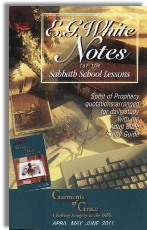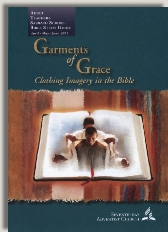|
||||||||||||||
Commentary on "The Coat of Different Colors"
Day 5: Wednesday, April 20, 2011 - The Coat Stripped
Overview
The lesson assumes that stripping Joseph of his robe was proof of his brothers' hate for this object that symbolized the threat Joseph was for them. It may be true that their stripping Joseph of his robe was a natural process in the crime they planned. After all, Jesus lost his coat before His crucifixion.
Observations
If the stripping of the coat is meant to be symbolic, it may well be a type of Jesus’ death. The brothers' attempt to kill Joseph is similar to Jesus' parable about the wicked servants:
"There was a master of a house who planted a vineyard and put a fence around it and dug a winepress in it and built a tower and leased it to tenants, and went into another country. When the season for fruit drew near, he sent his servants to the tenants to get his fruit. And the tenants took his servants and beat one, killed another, and stoned another. Again he sent other servants, more than the first. And they did the same to them. Finally he sent his son to them, saying, 'They will respect my son.' But when the tenants saw the son, they said to themselves, 'This is the heir. Come, let us kill him and have his inheritance.' And they took him and threw him out of the vineyard and killed him" (Matthew 21:33-39).
There are some striking similarities as well as dissimilarities between Joseph’s situation and Jesus's. In the parable, Jesus, the son of the master of the house, was going to inherit the vineyard. The tenants were thieves, dedicated to their plan of stealing the vineyard--or at least its fruits. They refuse to give back to the owner the fruits required from them, and they revolt. When the future potential owner of the vineyard comes, they kill him in order to steal his inheritance.
Joseph's brothers had similar motivations. Because of Joseph's dreams that highlight him as the potential inheritor of their father's wealth, they plan to kill him in order to put their hands on the inheritance. Also, as the wicked tenants refused to return the fruits, Joseph's brothers are disobedient to their father, becoming news for their father's years through Joseph's report. With few exceptions, they have no reservations in committing murder if this obtains for them the craved inheritance.
The dissimilarities between Jesus and Joseph come to the point of the nature of the inheritances and their ways of obtaining them. Joseph did nothing special, beside being born when his father was at an old age; still, he was the favorite son. We can't speculate about Jacob's intentions of giving him the birthright since the patriarch blessed Judah with this blessing. Still, the appearance of this intention may be seen in the coat Jacob made for Joseph.
On the contrary, Jesus was indeed going to inherit His Father’s Kingdom, but he had to work for this, to be obedient until death (Isaiah 53:12), with his death obtaining eternal redemption (Hebrews 9:12). The wicked tenants craved eternal life, they worked for it, but they failed to come with the proper fruits. This failure is illustrated in the history of the chosen people: they failed in their obedience; they needed somebody else to take their place, present the fruits of obedience, pay for their disobedience, and in this way obtain for them the inheritance. Instead, they thought that their obedience was theirs despite failure in giving back the required fruit, and they were terribly upset when their claims were not recognized.
This attitude is seen every time a child of God obtains through sheer grace, by faith alone, the gift of God’s righteousness. When God takes away the filthy robes of sin and covers the sinner with Christ’s spotless garment of righteousness, the legalists raise their voices in protest, doing everything they can to strip the believers of their new clothes. They hate their relatives who apparently, without doing anything special, simply by receiving the coat of Jesus’ righteousness, are designated for inheritance. The Bible speaks of putting on Jesus (Romans 13:14; Galatians 3:27), the imagery of being clothed in Jesus, sharing in his inheritance. God’s grace is an electing grace, and He doesn’t choose anybody for salvation because He sees some good, some higher moral achievements in him. The believer is simply a receiver as Joseph was a receiver of his father’s love. While they return in love toward their Father, the Father’s love for His children isn’t stirred or provoked by their love: “We love because he first loved us.” (1 John 4:19). The temporal and logical order is clear: God loved us when we were rebellious sinners (Rom. 5:7-10), and His love doesn’t depend on how well we respond and perform: “If we are faithless, he remains faithful” (2 Timothy 2:13). For legalists who are rooting their future expectations of blessings in fulfilling the conditions of obedience instead of relying on the obedience of another one who perfectly fulfilled it, such a situation is unjust, stirring their rage, prompting “cheap grace” accusations and enduring animosity. The coat of grace, good news in itself, is unfortunately bad news for many.
Copyright 2011 BibleStudiesForAdventists.com. All rights reserved. Revised April 20, 2011. This website is published by Life Assurance Ministries, Glendale, Arizona, USA, the publisher of Proclamation! Magazine. Contact email: BibleStudiesForAdventists@gmail.com.
The Sabbath School Bible Study Guide and the corresponding E.G. White Notes are published by Pacific Press Publishing Association, which is owned and operated by the Seventh-day Adventist church. The current quarter's editions are pictured above.
Official Adventist Resources
Standard Edition Study Guide Week 4
Teacher's Edition Study Guide Week 4
Easy Reading Edition Study Guide Wk 4
Search the Complete Published Ellen G. White Writings
Please Support This Project


